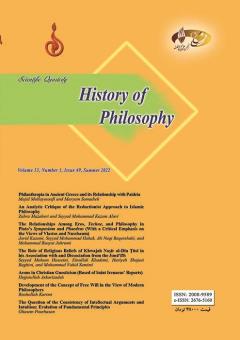Aeons in Christian Gnosticism (Based of Saint Irenaeus’ Reports)
Subject Areas : Geneology of philosophical schools and Ideas
1 - Lecturer at Payame Noor University, Larestan Branch, Larestan, Iran
Keywords: Aeon, Gnosticism, Pleroma, propator, Demurge, beatus ,
Abstract :
Aeons are among fundamental concepts in Christian gnosticism. On the one hand, they are rooted in the myths of ancient Greek gods and, on the other hand, they originate in Platonic philosophy and school and are integrated with the elements of Christianity and the Holy Book. Therefore, a conceptual and technical explanation of Aeons is important and plays a significant role in understanding the origins of early philosophical schools and ideas. Gnosticism and its founders, such as Valentinus, precede Plotinus, the founder of Neo-Platonism; hence, a clarification of gnostic concepts and, particularly, an analysis of the emanation of existents are of great importance in this school. Moreover, the etymology of dualism in gnosticism speaks of its original and fundamental relationship with Zoroastrian wisdom and the magi’s religion in ancient Iran. Therefore, a study of this point can reveal the integration of philosophical elements in ancient Iran and ancient Greece and the New and Old Testaments. Accordingly, this paper is intended to explain the concept of Aeons and the reasons of their emergence in Christian gnosticism based on Saint Erenaus’ reports and through investigating their roots in the technical philosophical terms in ancient Greece and the New and Old Testaments.
ابنفارس (1404 ق) معجم مقاییس اللغة، تصحيح عبدالسلام محمد هارون، قم: مکتب الاعلام الاسلامی.
بیرونی، ابوریحان (1386) آثار الباقیة عن القرون الخالیة، ترجمه اکبر داناسرشت، تهران: امیرکبیر.
ایلخانی، محمد (1390) تاریخ فلسفه در قرون وسطی و رنسانس، تهران: سمت.
حسینی زبیدی، محمدمرتضی (1414ق) تاج العروس من جواهر القاموس، تصحيح علی هلالی و علی سیری، بيروت: دارالفکر.
صاحب بن عباد ( 1414 ق) المحیط فی اللغه، تصحيح محمدحسن آل یاسین، بیروت: عالم الکتاب.
عسکریزاده، حجتالله (1400) «حكمت زرتشتي و آيين مجوس در منابع قديم يونان و روم»، فصلنامه تاریخ فلسفه، سال 12، شمارة 2، ص34 ـ17.
کاپلستون، فریدریک چارلز (1393) تاریخ فلسفه، ج2: فلسفه در قرون وسطی، ترجمه ابراهیم دادجو، تهران: سروش.
Anonymous, (1914). Hesiod, The Homeric Hymns and Homerica, with an English translation by H. G. Evelyn-White. London, W. Heinemann Ltd. New York: Mcmillan.
The Apostolic Bible Polyglot, (2006). Trans. by C. VanderPool, Apostolic Press.
Greek English lexicon, (1940) H.G. Lidell, & R.scoh(eds.), American Book Company; New York.
Irenaeus, bishop of Lyons, (1872). Against Heresies, Trans. by the Rev. John Keble, M.a., J. Parker and Co.Oxford, and 377 strand, London; Riyingtons, London, oxford, and Cambridge.
Platonis Opera, (1903). ed. John Burnet, Oxford University Press.
Sophocles, (1913). Ajax, Electra. Trachiniae. Philoctetes With an English translation by F. Storr. The Loeb classical library, 21. Francis Storr. London; New York. William Heinemann Ltd.; The Macmillan Company.

